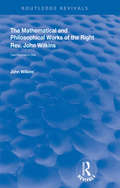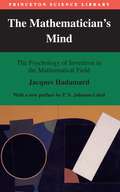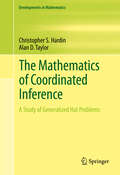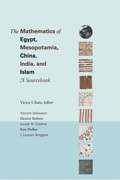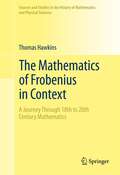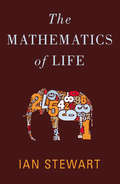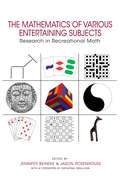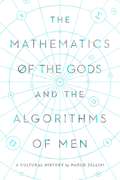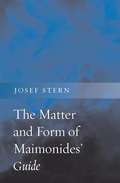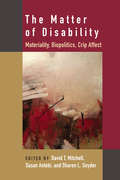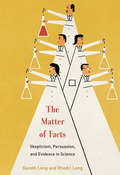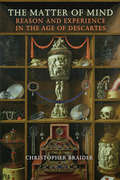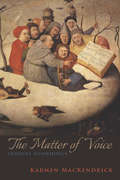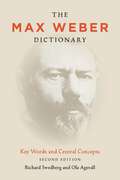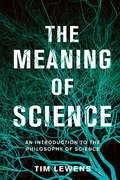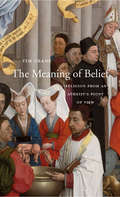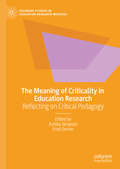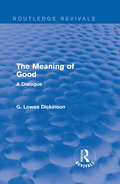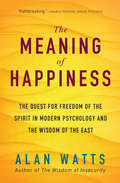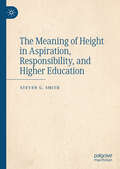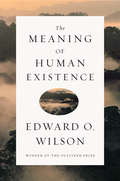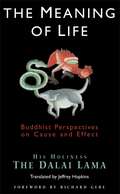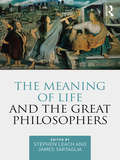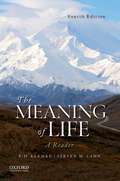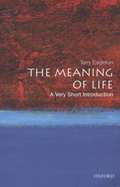- Table View
- List View
The Mathematical and Philosophical Works of the Right Rev. John Wilkins (Routledge Revivals)
by John WilkinsOriginally published in 1708, this volume is an exact facsimile reproduction the 1802 edition of The Mathematical and Philosophical Works of the Right Rev. John Wilkins, and includes an index, added for the 1970 new impression. The book includes the works of Bishop John Wilkins, as well as a note on the life of the author; Bishop John Wilkins, as Warden of Wadham Colelge, Oxford and Master of Trinity College Cambridge, played a major role in the revitalization of British university education in the middle of the seventeenth century. Moreover, he was a prime mover in the establishment of the Royal Society of London and was its first secretary.
The Mathematician's Mind: The Psychology of Invention in the Mathematical Field (Princeton Science Library #109)
by Jacques HadamardFifty years ago when Jacques Hadamard set out to explore how mathematicians invent new ideas, he considered the creative experiences of some of the greatest thinkers of his generation, such as George Polya, Claude Lévi-Strauss, and Albert Einstein. It appeared that inspiration could strike anytime, particularly after an individual had worked hard on a problem for days and then turned attention to another activity. In exploring this phenomenon, Hadamard produced one of the most famous and cogent cases for the existence of unconscious mental processes in mathematical invention and other forms of creativity. Written before the explosion of research in computers and cognitive science, his book, originally titled The Psychology of Invention in the Mathematical Field, remains an important tool for exploring the increasingly complex problem of mental life. The roots of creativity for Hadamard lie not in consciousness, but in the long unconscious work of incubation, and in the unconscious aesthetic selection of ideas that thereby pass into consciousness. His discussion of this process comprises a wide range of topics, including the use of mental images or symbols, visualized or auditory words, "meaningless" words, logic, and intuition. Among the important documents collected is a letter from Albert Einstein analyzing his own mechanism of thought.
The Mathematics of Coordinated Inference
by Christopher S. Hardin Alan D. TaylorTwo prisoners are told that they will be brought to a room and seated so that each can see the other. Hats will be placed on their heads; each hat is either red or green. The two prisoners must simultaneously submit a guess of their own hat color, and they both go free if at least one of them guesses correctly. While no communication is allowed once the hats have been placed, they will, however, be allowed to have a strategy session before being brought to the room. Is there a strategy ensuring their release? The answer turns out to be yes, and this is the simplest non-trivial example of a "hat problem. " This book deals with the question of how successfully one can predict the value of an arbitrary function at one or more points of its domain based on some knowledge of its values at other points. Topics range from hat problems that are accessible to everyone willing to think hard, to some advanced topics in set theory and infinitary combinatorics. For example, there is a method of predicting the value f(a) of a function f mapping the reals to the reals, based only on knowledge of f's values on the open interval (a - 1, a), and for every such function the prediction is incorrect only on a countable set that is nowhere dense. The monograph progresses from topics requiring fewer prerequisites to those requiring more, with most of the text being accessible to any graduate student in mathematics. The broad range of readership includes researchers, postdocs, and graduate students in the fields of set theory, mathematical logic, and combinatorics. The hope is that this book will bring together mathematicians from different areas to think about set theory via a very broad array of coordinated inference problems.
The Mathematics of Egypt, Mesopotamia, China, India, and Islam: A Sourcebook
by Kim Plofker Annette Imhausen Joseph Warren Dauben J. Lennart Berggren Eleanor RobsonIn recent decades it has become obvious that mathematics has always been a worldwide activity. But this is the first book to provide a substantial collection of English translations of key mathematical texts from the five most important ancient and medieval non-Western mathematical cultures, and to put them into full historical and mathematical context. The Mathematics of Egypt, Mesopotamia, China, India, and Islam gives English readers a firsthand understanding and appreciation of these cultures' important contributions to world mathematics. The five section authors--Annette Imhausen (Egypt), Eleanor Robson (Mesopotamia), Joseph Dauben (China), Kim Plofker (India), and J. Lennart Berggren (Islam)--are experts in their fields. Each author has selected key texts and in many cases provided new translations. The authors have also written substantial section introductions that give an overview of each mathematical culture and explanatory notes that put each selection into context. This authoritative commentary allows readers to understand the sometimes unfamiliar mathematics of these civilizations and the purpose and significance of each text. Addressing a critical gap in the mathematics literature in English, this book is an essential resource for anyone with at least an undergraduate degree in mathematics who wants to learn about non-Western mathematical developments and how they helped shape and enrich world mathematics. The book is also an indispensable guide for mathematics teachers who want to use non-Western mathematical ideas in the classroom.
The Mathematics of Frobenius in Context: A Journey Through 18th to 20th Century Mathematics
by Thomas HawkinsFrobenius made many important contributions to mathematics in the latter part of the 19th century. Hawkins here focuses on his work in linear algebra and its relationship with the work of Burnside, Cartan, and Molien, and its extension by Schur and Brauer. He also discusses the Berlin school of mathematics and the guiding force of Weierstrass in that school, as well as the fundamental work of d'Alembert, Lagrange, and Laplace, and of Gauss, Eisenstein and Cayley that laid the groundwork for Frobenius's work in linear algebra. The book concludes with a discussion of Frobenius's contribution to the theory of stochastic matrices.
The Mathematics of Life: The New Mathematics Of The Living World
by Ian StewartBiologists have long dismissed mathematics as being unable to meaningfully contribute to our understanding of living beings. Within the past ten years, however, mathematicians have proven that they hold the key to unlocking the mysteries of our world--and ourselves. In The Mathematics of Life, Ian Stewart provides a fascinating overview of the vital but little-recognized role mathematics has played in pulling back the curtain on the hidden complexities of the natural world--and how its contribution will be even more vital in the years ahead. In his characteristically clear and entertaining fashion, Stewart explains how mathematicians and biologists have come to work together on some of the most difficult scientific problems that the human race has ever tackled, including the nature and origin of life itself.
The Mathematics of Various Entertaining Subjects
by Raymond M. Smullyan Jennifer Beineke Jason RosenhouseThe history of mathematics is filled with major breakthroughs resulting from solutions to recreational problems. Problems of interest to gamblers led to the modern theory of probability, for example, and surreal numbers were inspired by the game of Go. Yet even with such groundbreaking findings and a wealth of popular-level books exploring puzzles and brainteasers, research in recreational mathematics has often been neglected. The Mathematics of Various Entertaining Subjects brings together authors from a variety of specialties to present fascinating problems and solutions in recreational mathematics.Contributors to the book show how sophisticated mathematics can help construct mazes that look like famous people, how the analysis of crossword puzzles has much in common with understanding epidemics, and how the theory of electrical circuits is useful in understanding the classic Towers of Hanoi puzzle. The card game SET is related to the theory of error-correcting codes, and simple tic-tac-toe takes on a new life when played on an affine plane. Inspirations for the book's wealth of problems include board games, card tricks, fake coins, flexagons, pencil puzzles, poker, and so much more.Looking at a plethora of eclectic games and puzzles, The Mathematics of Various Entertaining Subjects is sure to entertain, challenge, and inspire academic mathematicians and avid math enthusiasts alike.
The Mathematics of the Gods and the Algorithms of Men: A Cultural History
by Paolo ZelliniA masterful cultural history of mathematics from bestselling Italian mathematician and philosopher Paolo Zellini.Is mathematics a discovery or an invention? Have we invented numbers or do they truly exist? What sort of reality should we attribute to them? Mathematics has always been a way of understanding and ordering the world: from sacred ancient texts and pre-Socratic philosophers to twentieth-century logicians such as Russell and Frege and beyond. In this masterful, elegant book, mathematician and philosopher Paolo Zellini offers a brief cultural and intellectual history of mathematics, from ancient Greece to India to our contemporary obsession with algorithms, showing how mathematical thinking is inextricably linked with philosophical, existential and religious questions—and indeed with our cosmic understanding of the world.
The Matter and Form of Maimonides' Guide
by Josef SternMaimonides’ Guide of the Perplexed is generally read as an attempt either to harmonize reason and revelation or to show that they are irreconcilable. Moving beyond these familiar debates, Josef Stern argues that the perplexity addressed in this famously enigmatic work is the tension between human matter and form: the body and intellect.
The Matter of Disability: Materiality, Biopolitics, Crip Affect (Corporealities: Discourses Of Disability)
by David T. Mitchell Sharon L. Snyder Susan AntebiThe Matter of Disability returns disability to its proper place as an ongoing historical process of corporeal, cognitive, and sensory mutation operating in a world of dynamic, even cataclysmic, change. The book’s contributors offer new theorizations of human and nonhuman embodiments and their complex evolutions in our global present, in essays that explore how disability might be imagined as participant in the “complex elaboration of difference,” rather than something gone awry in an otherwise stable process. This alternative approach to materiality sheds new light on the capacities that exist within the depictions of disability that the book examines, including Spider-Man, Of Mice and Men, and Bloodchild.
The Matter of Facts: Skepticism, Persuasion, and Evidence in Science (The\mit Press Ser.)
by Gareth Leng Rhodri Ivor LengHow biases, the desire for a good narrative, reliance on citation metrics, and other problems undermine confidence in modern science.Modern science is built on experimental evidence, yet scientists are often very selective in deciding what evidence to use and tend to disagree about how to interpret it. In The Matter of Facts, Gareth and Rhodri Leng explore how scientists produce and use evidence. They do so to contextualize an array of problems confronting modern science that have raised concerns about its reliability: the widespread use of inappropriate statistical tests, a shortage of replication studies, and a bias in both publishing and citing “positive” results. Before these problems can be addressed meaningfully, the authors argue, we must understand what makes science work and what leads it astray. The myth of science is that scientists constantly challenge their own thinking. But in reality, all scientists are in the business of persuading other scientists of the importance of their own ideas, and they do so by combining reason with rhetoric. Often, they look for evidence that will support their ideas, not for evidence that might contradict them; often, they present evidence in a way that makes it appear to be supportive; and often, they ignore inconvenient evidence.In a series of essays focusing on controversies, disputes, and discoveries, the authors vividly portray science as a human activity, driven by passion as well as by reason. By analyzing the fluidity of scientific concepts and the dynamic and unpredictable development of scientific fields, the authors paint a picture of modern science and the pressures it faces.
The Matter of Mind: Reason and Experience in the Age of Descartes
by Christopher BraiderWhat influence did Ren#65533; Descartes' concept of mind-body dualism have on early modern conceptions of the self? In The Matter of Mind, Christopher Braider challenges the presumed centrality of Descartes' groundbreaking theory to seventeenth-century French culture. He details the broad opposition to rational self-government among Descartes' contemporaries, and attributes conventional links between Descartes and the myth of the 'modern subject' to post-structuralist assessments. The Matter of Mind presents studies drawn from a range of disciplines and examines the paintings of Nicolas Poussin, the drama of Pierre Corneille, and the theology of Blaise Pascal. Braider argues that if early modern thought converged on a single model, then it was the experimental picture based on everyday experience proposed by Descartes' sceptical adversary, Michel de Montaigne. Forceful and provocative, The Matter of Mind will encourage lively debate on the norms and discourses of seventeenth-century philosophy.
The Matter of Voice: Sensual Soundings
by Karmen MacKendrickPhilosophers for millennia have tried to silence the physical musicality of voice in favor of the purity of ideas without matter, souls without bodies. Nevertheless, voices resonate among bodies, among texts, and across denotation and sound; they are singular, as unique as fingerprints, but irreducibly collective too. They are material, somatic, and musical. But voices are also meaningful—they give body to concepts that cannot exist in abstractions, essential to sense yet in excess of it. They can be neither reduced to neurology nor silenced in abstraction. They complicate the logos of the beginning and emphasize the enfleshing of all words. Through explorations of theology and philosophy, pedagogy, translation, and semiotics, all interwoven with song, The Matter of Voice works toward reintegrating our thinking about both speaking and authorial voice as fleshy combinings of meaning and music.
The Max Weber Dictionary: Key Words and Central Concepts, Second Edition
by Richard Swedberg Ola AgevallMax Weber is one of the world's most important social scientists, but he is also one of the most notoriously difficult to understand. This revised, updated, and expanded edition of The Max Weber Dictionary reflects up-to-the-moment threads of inquiry and introduces the most recent translations and references. Additionally, the authors include new entries designed to help researchers use Weber's ideas in their own work; they illuminate how Weber himself thought theorizing should occur and how he went about constructing a theory. More than an elementary dictionary, however, this work makes a contribution to the general culture and legacy of Weber's work. In addition to entries on broad topics like religion, law, and the West, the completed German definitive edition of Weber's work (Max Weber Gesamtausgabe) necessitated a wealth of new entries and added information on topics like pragmatism and race and racism. Every entry in the dictionary delves into Weber scholarship and acts as a point of departure for discussion and research. As such, this book will be an invaluable resource to general readers, students, and scholars alike.
The Meaning Of Science: An Introduction To The Philosophy Of Science
by Tim LewensScience has produced explanations for everything from the mechanisms of insect navigation to the formation of black holes and the workings of black markets. But how much can we trust science, and can we actually know the world through it? How does science work and how does it fail? And how can the work of scientists help--or hurt--everyday people? These are not questions that science can answer on its own. This is where philosophy of science comes in. Studying science without philosophy is, to quote Einstein, to be "like somebody who has seen thousands of trees but has never seen a forest. " Cambridge philosopher Tim Lewens shows us the forest. He walks us through the theories of seminal philosophers of science Karl Popper and Thomas Kuhn and considers what science is, how far it can and should reach, and how we can determine the nature of its truths and myths. These philosophical issues have consequences that stretch far beyond the laboratory. For instance: What role should scientists have in policy discussions on environmental issues such as fracking? What are the biases at play in the search for a biological function of the female orgasm? If brain scans can be used to demonstrate that a decision was made several seconds before a person actually makes a conscious choice, what does that tell us about the possibility of free will? By examining science through this philosophical lens, Lewens reveals what physics can teach us about reality, what biology teaches us about human nature, and what cognitive science teaches us about human freedom. A masterful analysis of the biggest scientific and ethical issues of our age, The Meaning of Science forces us to confront the practical, personal, and political purposes of science--and why it matters to all of us.
The Meaning of Belief: Religion from an Atheist’s Point of View
by Tim CraneCurrent debate about religion seems to be going nowhere. Atheists persist with their arguments, many plausible and some unanswerable, but they make no impact on believers. Defenders of religion find atheists equally unwilling to cede ground. Noting that religion is not what atheists think it is, Tim Crane offers a way out of this stalemate.
The Meaning of Criticality in Education Research: Reflecting on Critical Pedagogy (Palgrave Studies in Education Research Methods)
by Fred Dervin Ashley SimpsonThis book explores, and problematizes, what it means to be ‘critical’ in education research. Drawing together chapters from diverse global perspectives, this volume aims to stimulate dialogue about possible meanings of criticality in education research. In doing so, they question why criticality has become such an essential part of education, and what researchers expect of it. The book opens up and contests some of the deficiencies of criticality in education research: ultimately it is not a global term, but often creates a false binary between East and West. Offering an alternative trajectory to educational narratives surrounding criticality, this book will be of interest and value to scholars of critical pedagogy and comparative education.
The Meaning of Good: A Dialogue (Routledge Revivals: Collected Works of G. Lowes Dickinson)
by G. Lowes DickinsonFirst published in 1937, this book presents itself as a philosophic dialogue, starting with the diversity of men’s ideas about Good. In the first part, it considers the creation and criteria of Good and its relation to truth, pleasure and happiness. In the second part, the book examines some kinds of Good, pointing out their defects and limitations, and suggesting the character of Good which we might hold to be perfect. The topic of the book is treated both philosophically and practically making it intriguing reading.
The Meaning of Happiness: The Quest for Freedom of the Spirit in Modern Psychology and the Wisdom of the East
by Alan WattsDeep down, most people think that happiness comes from having or doing something. Here, in Alan Watts&’s groundbreaking third book (originally published in 1940), he offers a more challenging thesis: authentic happiness comes from embracing life as a whole in all its contradictions and paradoxes, an attitude that Watts calls the &“way of acceptance.&” Drawing on Eastern philosophy, Western mysticism, and analytic psychology, Watts demonstrates that happiness comes from accepting both the outer world around us and the inner world inside us — the unconscious mind, with its irrational desires, lurking beyond the awareness of the ego. Although written early in his career, The Meaning of Happiness displays the hallmarks of his mature style: the crystal-clear writing, the homespun analogies, the dry wit, and the breadth of knowledge that made Alan Watts one of the most influential philosophers of his generation.
The Meaning of Height in Aspiration, Responsibility, and Higher Education
by Steven G. SmithThe Meaning of Height takes seriously the traditional figure of “higher life” for intrinsically preferable manners of living. Reworking the Platonic model of ascent to the ideal and descent to responsible engagement with the world, The Meaning of Height lays out concrete possible itineraries of reaching (upward to new acquisitions of personal capacity) and righting (downward from prompts for good order), showing connections between individual and social fulfillment. By focusing on our diversely demanding encounters with the interesting, the important, and the transcendent, the book strikes a counterpoint to the commonly homogenized conception of personal “happiness.” It also counters illiberal views of higher education with a Humboldtian vitality argument for a meaningfully “high” higher education geared to full development of human faculties, a level of education to which the disciplines of philosophy and religious studies make essential contributions. The book concludes by considering the essential role of this sort of higher education in democratic societies.
The Meaning of Human Existence
by Edward O. WilsonNational Book Award Finalist. How did humanity originate and why does a species like ours exist on this planet? Do we have a special place, even a destiny in the universe? Where are we going, and perhaps, the most difficult question of all, "Why?" In The Meaning of Human Existence, his most philosophical work to date, Pulitzer Prize-winning biologist Edward O. Wilson grapples with these and other existential questions, examining what makes human beings supremely different from all other species. Searching for meaning in what Nietzsche once called "the rainbow colors" around the outer edges of knowledge and imagination, Wilson takes his readers on a journey, in the process bridging science and philosophy to create a twenty-first-century treatise on human existence--from our earliest inception to a provocative look at what the future of mankind portends. Continuing his groundbreaking examination of our "Anthropocene Epoch," which he began with The Social Conquest of Earth, described by the New York Times as "a sweeping account of the human rise to domination of the biosphere," here Wilson posits that we, as a species, now know enough about the universe and ourselves that we can begin to approach questions about our place in the cosmos and the meaning of intelligent life in a systematic, indeed, in a testable way. Once criticized for a purely mechanistic view of human life and an overreliance on genetic predetermination, Wilson presents in The Meaning of Human Existence his most expansive and advanced theories on the sovereignty of human life, recognizing that, even though the human and the spider evolved similarly, the poet's sonnet is wholly different from the spider's web. Whether attempting to explicate "The Riddle of the Human Species," "Free Will," or "Religion"; warning of "The Collapse of Biodiversity"; or even creating a plausible "Portrait of E.T.," Wilson does indeed believe that humanity holds a special position in the known universe. The human epoch that began in biological evolution and passed into pre-, then recorded, history is now more than ever before in our hands. Yet alarmed that we are about to abandon natural selection by redesigning biology and human nature as we wish them, Wilson soberly concludes that advances in science and technology bring us our greatest moral dilemma since God stayed the hand of Abraham.
The Meaning of Life
by Jeffrey Hopkins Richard Gere His Holiness the Dalai LamaUsing the traditional Buddhist allegorical image of the Wheel of Life and the teaching of the twelve links of dependent origination, the Dalai Lama deftly illustrates how our existence, though fleeting and often full of woes, brims with the potential for peace and happiness. We can realize that potential by cultivating a wise appreciation of the interdependency of actions and experience, and by living a kind and compassionate life. A life thus lived, the Dalai Lama teaches, becomes thoroughly meaningful for both oneself and for others.
The Meaning of Life and the Great Philosophers
by Stephen Leach James TartagliaThe Meaning of Life and the Great Philosophers reveals how great philosophers of the past sought to answer the question of the meaning of life. This edited collection includes thirty-five chapters which each focus on a major philosophical figure, from Confucius to Rorty, and that imaginatively engage with the topic from their perspective. This volume also contains a Postscript on the historical origins and original significance of the phrase ‘the meaning of life’. Written by leading experts in the field, such as A.C. Grayling, Thaddeus Metz and John Cottingham, this unique and engaging book explores the relevance of the history of philosophy to contemporary debates. It will prove essential reading for students and scholars studying the history of philosophy, philosophy of religion, ethics, metaphysics or comparative philosophy.
The Meaning of Life: A Reader
by Steven M. Cahn E. D. KlemkeThis book is the preeminent anthology on the topic. Featuring twenty-five insightful selections by prominent philosophers, it serves as an ideal core text for courses on the meaning of life and introduction to philosophy courses where the topic is emphasized. <p><p> In Part I the articles defend the view that without faith in God, life has no meaning or purpose. In Part II the selections oppose this claim, defending instead a nontheistic, humanistic alternative―that life can have meaning even in the absence of theistic commitment. <p><p> In Part III the readings address whether the question of the meaning of life is itself meaningful. A new Part IV on the end of life raises issues about how understanding death affects our understanding of the meaning of life.
The Meaning of Life: A Very Short Introduction
by Terry EagletonThe phrase "the meaning of life" for many seems a quaint notion fit for satirical mauling by Monty Python or Douglas Adams. But in this spirited Very Short Introduction, famed critic Terry Eagleton takes a serious if often amusing look at the question and offers his own surprising answer. Eagleton first examines how centuries of thinkers and writers--from Marx and Schopenhauer to Shakespeare, Sartre, and Beckett--have responded to the ultimate question of meaning. He suggests, however, that it is only in modern times that the question has become problematic. But instead of tackling it head-on, many of us cope with the feelings of meaninglessness in our lives by filling them with everything from football to sex, Kabbala, Scientology, "New Age softheadedness," or fundamentalism. On the other hand, Eagleton notes, many educated people believe that life is an evolutionary accident that has no intrinsic meaning. If our lives have meaning, it is something with which we manage to invest them, not something with which they come ready made. Eagleton probes this view of meaning as a kind of private enterprise, and concludes that it fails to holds up. He argues instead that the meaning of life is not a solution to a problem, but a matter of living in a certain way. It is not metaphysical but ethical. It is not something separate from life, but what makes it worth living--that is, a certain quality, depth, abundance and intensity of life. Here then is a brilliant discussion of the problem of meaning by a leading thinker, who writes with a light and often irreverent touch, but with a very serious end in mind.
